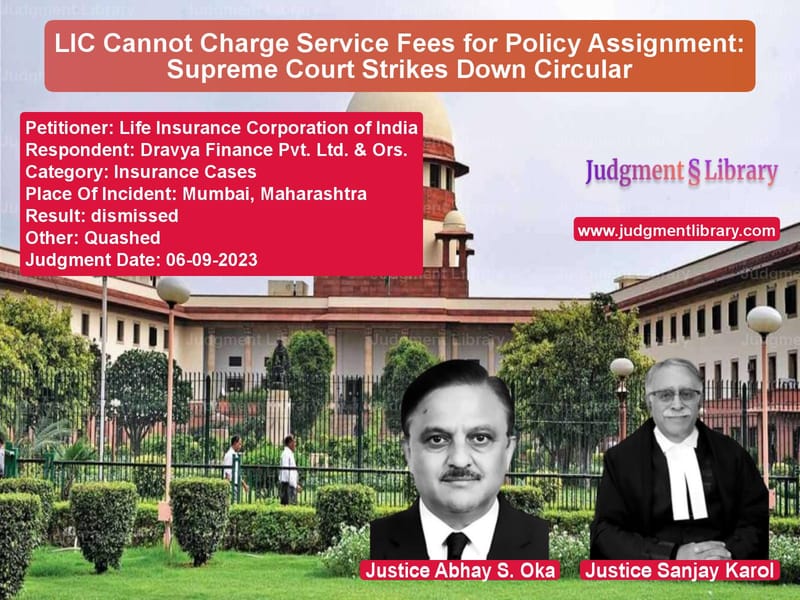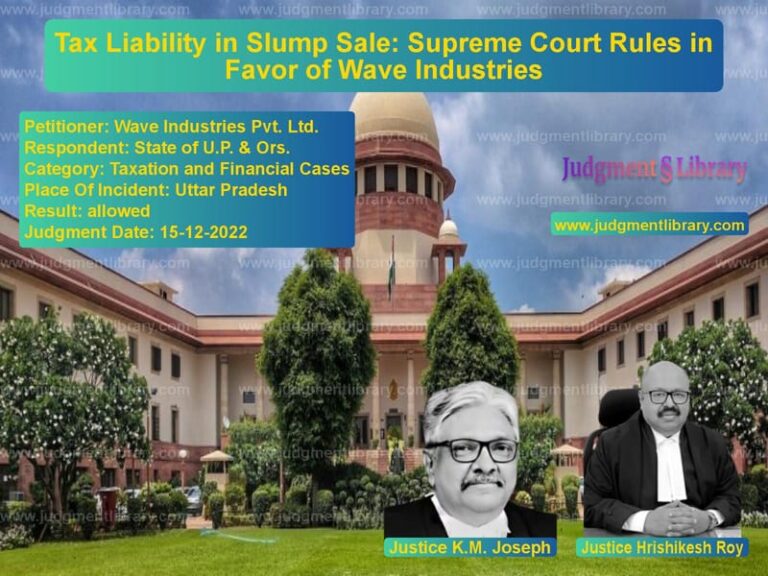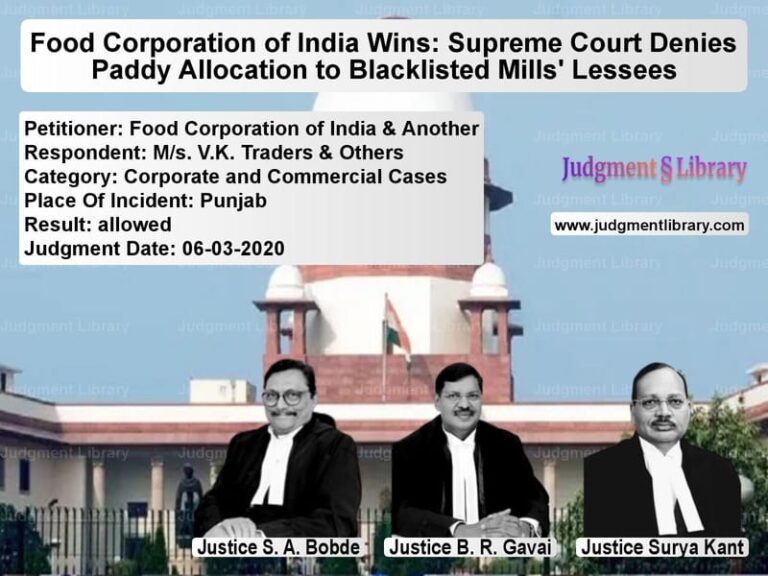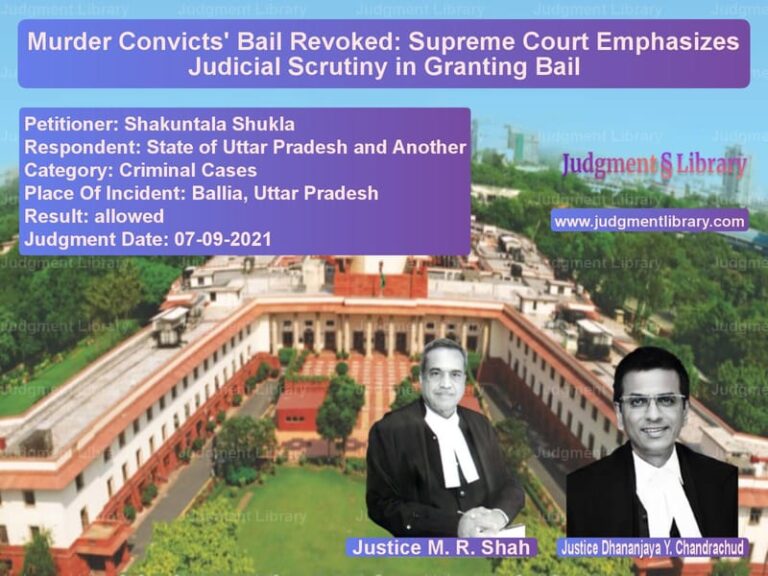LIC Cannot Charge Service Fees for Policy Assignment: Supreme Court Strikes Down Circular
The Supreme Court of India recently delivered a landmark judgment in the case of Life Insurance Corporation of India vs. Dravya Finance Pvt. Ltd. & Ors., addressing the issue of whether Life Insurance Corporation (LIC) could charge a fee for the registration of assignments of life insurance policies. The ruling reaffirmed the principle that LIC cannot impose service charges for assignments unless explicitly authorized by law.
The Court upheld the Bombay High Court’s decision, which had struck down LIC’s circular imposing a ₹250 service charge for recording policy assignments. The judgment emphasizes that statutory provisions govern life insurance policy assignments, and any additional charges beyond those specified in the law are unlawful.
Background of the Case
The dispute originated when LIC issued a circular on April 24, 2006, imposing a registration charge of ₹250 for each assignment of a life insurance policy. Dravya Finance Pvt. Ltd., a finance company engaged in assignments of insurance policies, challenged this charge before the Bombay High Court. The company argued that:
- The circular violated Section 38 of the Insurance Act, 1938, which governs policy assignments.
- The charge was unconstitutional under Article 265 of the Indian Constitution, as it lacked legal authorization.
- The levy amounted to an arbitrary financial burden on policyholders.
The Bombay High Court ruled in favor of Dravya Finance Pvt. Ltd., declaring the circular unconstitutional and striking it down. LIC appealed this decision before the Supreme Court.
Key Legal Issues Considered
- Whether LIC had the legal authority to charge a service fee for recording assignments.
- Whether such charges violated statutory provisions under the Insurance Act, 1938.
- Whether the imposition of the charge violated constitutional principles, particularly Article 265.
Petitioner’s Arguments (LIC)
LIC, represented by senior counsel, contended that:
- LIC operates as a business entity and must recover administrative costs incurred in processing assignments.
- Under Section 6 of the Life Insurance Corporation Act, 1956, LIC has the authority to conduct its business in accordance with sound commercial principles.
- The ₹250 service charge covered administrative expenses incurred in processing assignments, making it a legitimate business cost rather than a tax.
- LIC receives thousands of assignment requests, resulting in substantial operational expenses.
Respondent’s Arguments (Dravya Finance Pvt. Ltd.)
The respondents argued that:
- Section 38 of the Insurance Act, 1938, which governs assignments, does not authorize LIC to levy any fees beyond ₹1 for acknowledging receipt of an assignment notice.
- The circular was an unlawful attempt to impose a financial burden on policyholders.
- LIC’s justification of “administrative costs” was arbitrary and lacked statutory backing.
- The charge violated Article 265 of the Constitution, which states that no tax shall be levied or collected except by the authority of law.
Supreme Court’s Analysis
The Supreme Court carefully analyzed the relevant legal provisions, particularly Section 38 of the Insurance Act, 1938, which governs the assignment and transfer of insurance policies. The Court found that:
- Section 38(4) mandates insurers to record assignments upon receipt of a duly executed transfer instrument but does not authorize insurers to charge fees beyond ₹1 for acknowledging receipt of such notices.
- The Insurance Regulatory and Development Authority of India (IRDAI) Regulations, 2015, which govern policy assignments, explicitly prohibit insurers from charging additional fees for recording assignments.
- LIC’s reliance on business principles under the LIC Act was misplaced, as statutory provisions override any business-related justifications.
- LIC failed to demonstrate any legal authorization for imposing the ₹250 service charge.
The judgment observed:
“It is well settled that if the law requires a particular thing to be done in a particular manner, it must be done in that manner and not in any other manner.”
The Court further noted:
“Section 38 does not authorize the levy of any such fee. The legislature, in its wisdom, has not provided for any charge beyond what is explicitly mentioned in the statute.”
Final Judgment
The Supreme Court ruled in favor of the respondents and dismissed LIC’s appeal, concluding that:
- LIC’s circular imposing the ₹250 service charge was unconstitutional and lacked statutory backing.
- The Insurance Act does not permit insurers to impose additional fees for assignments beyond those explicitly mentioned.
- LIC’s reliance on business principles was irrelevant in the face of clear statutory provisions.
- LIC was directed to discontinue the collection of the service charge immediately.
The Court stated:
“For the aforesaid reasons, we find no error in the view taken by the High Court that the appellant–insurer had no right to claim fees of ₹250 for recording the endorsement of assignment or transfer.”
Implications of the Judgment
- Strengthens consumer protection by preventing arbitrary charges on policyholders.
- Reaffirms the principle that statutory provisions override business practices in regulated sectors.
- Ensures that insurers cannot introduce unauthorized service charges beyond what is permitted by law.
- Sets a precedent that regulatory bodies like IRDAI have the final authority in matters related to insurance policy assignments.
Conclusion
The Supreme Court’s ruling in this case is a landmark judgment affirming the primacy of statutory provisions over arbitrary business decisions in the insurance sector. By striking down LIC’s unauthorized service charge, the Court has reinforced consumer rights and regulatory compliance. This decision serves as a critical precedent ensuring that insurers adhere strictly to the legal framework and do not impose unjustified financial burdens on policyholders.
Petitioner Name: Life Insurance Corporation of India.Respondent Name: Dravya Finance Pvt. Ltd. & Ors..Judgment By: Justice Abhay S. Oka, Justice Sanjay Karol.Place Of Incident: Mumbai, Maharashtra.Judgment Date: 06-09-2023.
Don’t miss out on the full details! Download the complete judgment in PDF format below and gain valuable insights instantly!
Download Judgment: life-insurance-corpo-vs-dravya-finance-pvt.-supreme-court-of-india-judgment-dated-06-09-2023.pdf
Directly Download Judgment: Directly download this Judgment
See all petitions in Insurance Settlements
See all petitions in Life Insurance Claims
See all petitions in Judgment by Abhay S. Oka
See all petitions in Judgment by Sanjay Karol
See all petitions in dismissed
See all petitions in Quashed
See all petitions in supreme court of India judgments September 2023
See all petitions in 2023 judgments
See all posts in Insurance Cases Category
See all allowed petitions in Insurance Cases Category
See all Dismissed petitions in Insurance Cases Category
See all partially allowed petitions in Insurance Cases Category







